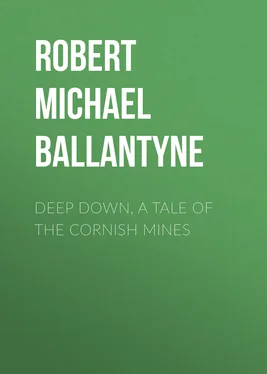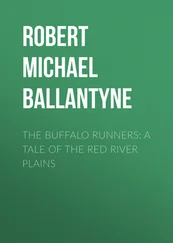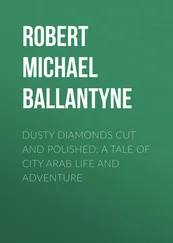Robert Michael Ballantyne - Deep Down, a Tale of the Cornish Mines
Здесь есть возможность читать онлайн «Robert Michael Ballantyne - Deep Down, a Tale of the Cornish Mines» — ознакомительный отрывок электронной книги совершенно бесплатно, а после прочтения отрывка купить полную версию. В некоторых случаях можно слушать аудио, скачать через торрент в формате fb2 и присутствует краткое содержание. Жанр: foreign_children, literature_19, foreign_antique, foreign_prose, на английском языке. Описание произведения, (предисловие) а так же отзывы посетителей доступны на портале библиотеки ЛибКат.
- Название:Deep Down, a Tale of the Cornish Mines
- Автор:
- Жанр:
- Год:неизвестен
- ISBN:нет данных
- Рейтинг книги:4 / 5. Голосов: 1
-
Избранное:Добавить в избранное
- Отзывы:
-
Ваша оценка:
- 80
- 1
- 2
- 3
- 4
- 5
Deep Down, a Tale of the Cornish Mines: краткое содержание, описание и аннотация
Предлагаем к чтению аннотацию, описание, краткое содержание или предисловие (зависит от того, что написал сам автор книги «Deep Down, a Tale of the Cornish Mines»). Если вы не нашли необходимую информацию о книге — напишите в комментариях, мы постараемся отыскать её.
Deep Down, a Tale of the Cornish Mines — читать онлайн ознакомительный отрывок
Ниже представлен текст книги, разбитый по страницам. Система сохранения места последней прочитанной страницы, позволяет с удобством читать онлайн бесплатно книгу «Deep Down, a Tale of the Cornish Mines», без необходимости каждый раз заново искать на чём Вы остановились. Поставьте закладку, и сможете в любой момент перейти на страницу, на которой закончили чтение.
Интервал:
Закладка:
The ship passed like a dark phantom over the very head of the miner who was at work many fathoms below the bottom of the sea.
“Land, ho!” came suddenly in a fierce, quick shout from the mast-head.
“Starboard! starboard—hard!” cried the captain, as the roar of breakers ahead rose above the yelling of the storm.
Before the order was obeyed or another word spoken the ship struck, and a shriek of human terror followed, as the foremast went by the board with a fearful crash. The waves burst over the stern, sweeping the decks fore and aft. Wave after wave lifted the great ship as though it had been a child’s toy, and dashed her down upon the rocks. Her bottom was stove in, her planks and timbers were riven like matchwood. Far down below man was destroying the flinty rock, while overhead the rock was destroying the handiwork of man! But the destruction in the one case was slow, in the other swift. A desperate but futile effort was made by the crew to get out the boats, and the passengers, many of whom were women and children, rushed frantically from the cabin to the deck, and clung to anything they could lay hold of, until strength failed, and the waves tore them away.
One man there was in the midst of all the terror-stricken crew who retained his self-possession in that dread hour. He was a tall, stern old man with silver locks—an Indian merchant, one who had spent his youth and manhood in the wealthy land collecting gold—“making a fortune,” he was wont to say—and who was returning to his fatherland to spend it. He was a thinking and calculating man, and in the anticipation of some such catastrophe as had actually overtaken him, he had secured some of his most costly jewels in a linen belt. This belt, while others were rushing to the boats, the old man secured round his waist, and then sprang on deck, to be swept, with a dozen of his fellow-passengers, into the sea by the next wave that struck the doomed vessel. There was no one on that rugged coast to lend a helping hand. Lifeboats did not then, as now, nestle in little nooks on every part of our dangerous coasts. No eye was there to see nor ear to hear, when, twenty minutes after she struck, the East-Indiaman went to pieces, and those of her crew and passengers who had retained their hold of her uttered their last despairing cry, and their souls returned to God who gave them.
It is a solemn thought that man may with such awful suddenness, and so unexpectedly, be summoned into the presence of his Maker. Thrice happy they who, when their hearts grow chill and their grasps relax as the last plank is rending, can say, “Neither death, nor life, nor any other creature, is able to separate us from the love of God, which is in Christ Jesus our Lord.”
The scene we have described was soon over, and the rich cargo of the East-Indiaman was cast upon the sea and strewn upon the shore, affording much work for many days to the coastguard, and greatly exciting the people of the district—most of whom appeared to entertain an earnest belief in the doctrine that everything cast by storms upon their coast ought to be considered public property. Portions of the wreck had the name “Trident” painted on them, and letters found in several chests which were washed ashore proved that the ship had sailed from Calcutta, and was bound for the port of London. One little boy alone escaped the waves. He was found in a crevice of the cliffs the following day, with just enough vitality left to give a few details of the wreck. Although all possible care was bestowed on him, he died before night.
Thus sudden and complete was the end of as fine a ship as ever spread her canvas to the breeze. At night she had been full of life—full of wealth; in the morning she was gone—only a few bales and casks and broken spars to represent the wealth, and stiffened corpses to tell of the life departed. So she came and went, and in a short time all remnants of her were carried away.
One morning, a few weeks after the night of the storm, Maggot the smith turned himself in his bed at an early hour, and, feeling disinclined to slumber, got up to look at the state of the weather. The sun was just rising, and there was an inviting look about the morning which induced the man to dress hastily and go out.
Maggot was a powerfully-built man, rough in his outer aspect as well as in his inner man, but by no means what is usually termed a bad man, although, morally speaking, he could not claim to be considered a good one. In fact, he was a hearty, jolly, reckless fisherman, with warm feelings, enthusiastic temperament, and no principle; a man who, though very ready to do a kind act, had no particular objection to do one that was decidedly objectionable when it suited his purpose or served his present interest. He was regarded by his comrades as one of the greatest madcaps in the district. Old Maggot was, as we have said, a blacksmith to trade, but he had also been bred a miner, and was something of a fisherman as well, besides being (like most of his companions) an inveterate smuggler. He could turn his hand to almost anything, and was “everything by turns, but nothing long.”
Sauntering down to Priests Cove, on the south of Cape Cornwall, with his hands in his pockets and his sou’-wester stuck carelessly on his shaggy head, he fell in with a comrade, whom he hailed by the name of John Cock. This man was also a fisherman, et cetera , and the bosom friend and admirer of Maggot.
“Where bound to this mornin’, Jack?” inquired Maggot.
“To fish,” replied John.
“I go with ’ee, booy,” said Maggot.
This was the extent of the conversation at that time. They were not communicative, but walked side by side in silence to the beach, where they launched their little boat and rowed out to sea.
Presently John Cock looked over his shoulder and exclaimed— “Maggot, I see summat.”
“Do ’ee?”
“Iss do I.”
“What do un look like?”
“Like a dead corp.”
“Aw, my dear,” said Maggot, “lev us keep away. It can do no good to we.”
Acting on this opinion the men rowed past the object that was floating on the sea, and soon after began to fish; but they had not fished long when the dead body, drifted probably by some cross-current, appeared close to them again. Seeing this they changed their position, but ere long the body again appeared.
“P’raps,” observed Maggot, “there’s somethin’ in its pockets.”
As the same idea had occurred to John Cock, the men resolved to examine the body, so they rowed up to it and found it to be that of an elderly man, much decomposed, and nearly naked. A very short examination sufficed to show that the pockets of such garments as were still upon it were empty, and the men were about to let it go again, when Maggot exclaimed—
“Hold fast, Jack, I see somethin’ tied round the waist of he; a sort o’ belt it do seem.”
The belt was quickly removed and the body released, when it sank with a heavy plunge, but ere long reappeared on the surface. The fishermen rowed a considerable distance away from it, and then shipped their oars and examined the belt, which was made of linen. Maggot sliced it up as he would have ripped up a fish, and laid bare, to the astonished gaze of himself and his friend, a number of glittering gems of various colours, neatly and firmly embedded in cotton, besides a variety of rings and small brooches set with precious stones.
“Now, I tell ’ee,” said Maggot, “’tis like as this here will make our fortin’, or else git we into trouble.”
“Why, whatever shud we git into trouble ’bout it for?” said John Cock. “’Tis like as not they ain’t real—only painted glass, scarce wuth the trouble o’ car’in’ ashore.”
“Hould thy tongue, thee g’eat chucklehead,” replied Maggot; “a man wouldn’t go for to tie such stuff round his waist to drown hisself with, I do know, if they worn’t real. Lev us car’ ’em to Maister Donnithorne.”
Читать дальшеИнтервал:
Закладка:
Похожие книги на «Deep Down, a Tale of the Cornish Mines»
Представляем Вашему вниманию похожие книги на «Deep Down, a Tale of the Cornish Mines» списком для выбора. Мы отобрали схожую по названию и смыслу литературу в надежде предоставить читателям больше вариантов отыскать новые, интересные, ещё непрочитанные произведения.
Обсуждение, отзывы о книге «Deep Down, a Tale of the Cornish Mines» и просто собственные мнения читателей. Оставьте ваши комментарии, напишите, что Вы думаете о произведении, его смысле или главных героях. Укажите что конкретно понравилось, а что нет, и почему Вы так считаете.












